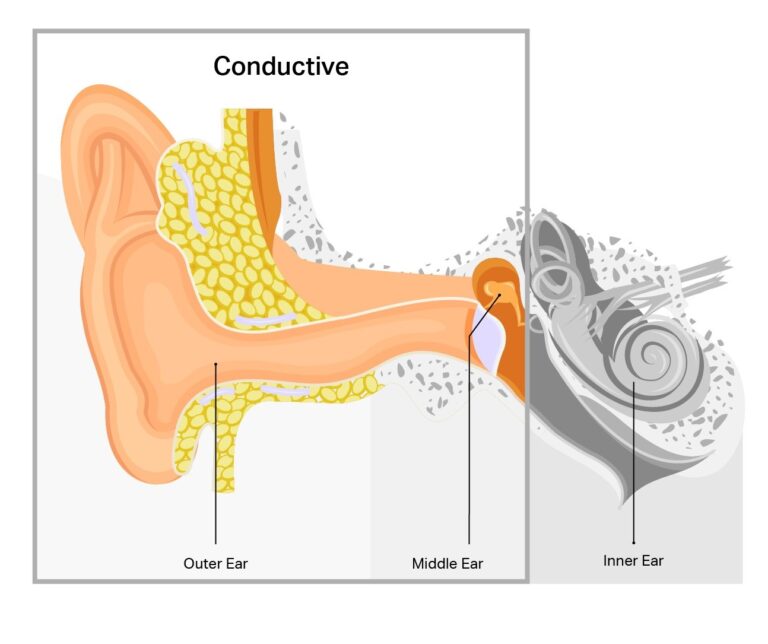Conductive hearing loss makes it hard to hear properly because sound waves can’t travel well through the outer or middle ear. In this blog, we’ll talk about why this happens, how it affects people, and what can be done to treat it.
What Is Conductive Hearing Loss?
Conductive hearing loss happens when something blocks or damages the outer or middle ear, making it hard for sound to travel through.
This can be due to earwax buildup, infections, or problems with the tiny bones in the ear. When this happens, sounds might seem muffled or quiet.
But the good news is that in many cases, it can be fixed with treatments like removing earwax, taking antibiotics for infections, or even surgery if needed. Sometimes, though, hearing aids might be needed to help improve hearing.

Common Causes of Conductive Hearing Loss
- Ear Infections: Bacterial or viral infections in the ear can cause swelling and fluid buildup, which blocks sound.
- Earwax Buildup: Too much earwax can clog the ear canal, stopping sound waves from reaching the eardrum.
- Otitis Media: This is when the middle ear gets inflamed, often due to infections or allergies, leading to fluid buildup and hearing problems.
- Perforated Eardrum: If the eardrum gets a hole from injury, infection, or pressure changes, it can cause conductive hearing loss.
- Otosclerosis: Unusual bone growth in the middle ear can mess with the tiny bones that move sound, causing hearing trouble.
- Middle Ear Tumors: Growths, whether benign or malignant, can mess up the way the ear works, leading to hearing loss.
Symptoms of Conductive Hearing Loss
- Muffled or Dull Sounds: People with this type of hearing loss find it hard to hear clearly. Sounds may seem less sharp or quiet.
- Trouble Understanding Speech: Speech might sound fuzzy or strange, especially in noisy places. It can be tough to follow conversations.
- Ear Pain or Discomfort: Some may feel pain, pressure, or like their ears are full. This can happen because of infections or too much earwax.
- Ringing or Buzzing in Ears (Tinnitus): Some might hear ringing, buzzing, or humming sounds in their ears along with the hearing loss.
- Frequent Ear Infections: Getting lots of ear infections, especially in the middle ear, can lead to this type of hearing loss. Infections cause fluid buildup and swelling.
- Difficulty Hearing Quiet Sounds: It’s hard to hear soft or far-away sounds, like whispers or quiet speech.
Treatment Options For Conductive Hearing Loss
Medications: Antibiotics or antifungal drugs are used to clear up ear infections, which can help improve hearing.
Ear Cleaning: Special procedures like ear irrigation or suction are done to remove excess earwax with ear cleaning tools, making it easier to hear.
Surgery: Sometimes, surgery is needed to fix a hole in the eardrum or deal with abnormal bone growth in the middle ear.
Hearing Devices: Hearing aids or other hearing machines can be used to make sounds louder and clearer for people with conductive hearing loss.
Prevention And Lifestyle Tips
While some causes of conductive hearing loss are unavoidable, there are steps individuals can take to minimize their risk:
- Practice good ear hygiene and avoid inserting objects into the ear canal.
- Seek prompt treatment for ear infections and other ear-related conditions.
- Protect the ears from loud noises and use earplugs in noisy environments.
- Attend regular check-ups with an audiologist for early detection and management of hearing loss.
Conclusion
Conductive hearing loss can make life harder, affecting how well we communicate and feel overall. If you or someone you care about shows signs of it, don’t wait—see an audiologist. They can help you figure out what’s happening with your ears and how to improve things.
By getting the right diagnosis and treatment and taking steps to prevent future problems, you can manage conductive hearing loss and feel better. Remember, your hearing health matters, so don’t hesitate to reach out for help when you need it.


